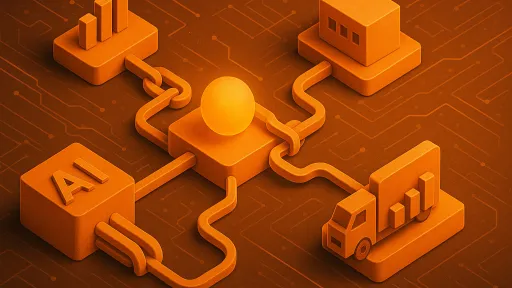
Imagine being able to trace exactly where your coffee beans came from or verify the authenticity of essential medicines with just a few clicks. In Africa, these possibilities aren’t futuristic scenarios, they’re happening today, thanks to blockchain technology. Over recent years, Africa has become a vibrant hub for technological innovation, with blockchain emerging as a game-changing solution for one of the continent's most critical yet problematic sectors: supply chain logistics.
Across the continent, logistics systems often face daunting challenges think of persistent inefficiencies, fraud, corruption, and a frustrating lack of transparency. These obstacles don't just slow down trade , they can directly affect people's health, livelihoods, and economic opportunities. Fortunately, blockchain technology offers a revolutionary path forward, reshaping African supply chains by promoting transparency, reducing costs, and boosting efficiency in profound ways.
Why Blockchain Matters for Africa’s Supply Chains
Blockchain technology, at its core, is a decentralized, secure digital ledger that records transactions transparently and immutably. It’s precisely these qualities that make blockchain ideally suited to address many of the challenges African supply chains currently face.
Take the agricultural sector, for instance. Farmers, businesses, and consumers all benefit from being able to trace products from farm to fork. In Ghana, blockchain technology has been successfully employed to track cocoa production, giving consumers the ability to verify exactly where their chocolate originated. By providing transparent records of every step from harvesting to export, this approach not only increases consumer confidence but also empowers local farmers by creating fairer, more accountable market conditions.
Beyond agriculture, blockchain is proving critical in combating one of the continent’s most dangerous issues: counterfeit goods. Counterfeit medicines are a severe health threat in countries like Nigeria, but blockchain is now enabling the verification of genuine pharmaceuticals, significantly reducing the circulation of fake products. Each product's journey is meticulously recorded, making fraud practically impossible and ensuring that consumers receive safe, genuine medicines.
Real-world Impact: Faster, Smarter Logistics
Blockchain’s benefits go beyond just traceability, it also streamlines logistics by automating and simplifying cumbersome documentation processes. Consider Kenya’s bustling Mombasa port, where blockchain solutions are already being used to optimize goods transportation. By digitizing and automating critical processes, blockchain significantly reduces the time goods spend in transit, cuts congestion, and improves overall operational efficiency. In short, fewer delays mean reduced costs and increased reliability for businesses and consumers alike.
Moreover, when blockchain technology is combined with other digital innovations such as the Internet of Things (IoT) and Artificial Intelligence (AI), African countries can achieve even more impressive outcomes. In South Africa, for example, blockchain, IoT sensors, and AI analytics are being used together to manage cold-chain logistics, ensuring perishable goods remain fresh throughout their journey. This kind of intelligent, integrated system helps businesses respond swiftly to market conditions, reduce waste, and ensure product quality.
Challenges to Blockchain Adoption and How to Overcome Them
Of course, the path to widespread blockchain adoption isn't without its obstacles. Africa faces hurdles such as inadequate digital infrastructure, uneven internet access, limited technical skills, and regulatory uncertainties. However, these challenges aren’t insurmountable. They simply underline the importance of collaboration among policymakers, technology providers, and private enterprises.
African governments and businesses must prioritize investments in digital infrastructure and education, building regulatory frameworks that nurture innovation rather than hinder it. Creating public-private partnerships can accelerate blockchain projects, promote technology transfer, and ensure the benefits reach all stakeholders, from small-scale farmers to global consumers.
Moving Forward: Africa’s Blockchain Future
Blockchain holds enormous potential to reshape Africa’s supply chains, making them not just more efficient and transparent, but also more secure and equitable. As the continent embraces digital transformation, leveraging blockchain could position Africa at the forefront of global logistics innovation.
The time for action is now. For African professionals, tech leaders, policymakers, and businesses looking to seize these opportunities, Xelius offers expert guidance. Our experienced team can help you navigate the complexities of blockchain implementation, tailoring solutions to your unique needs.
Ready to explore how blockchain can transform your logistics operations?
Visit our website today to book a consultation, and together, let’s build Africa’s digital future.